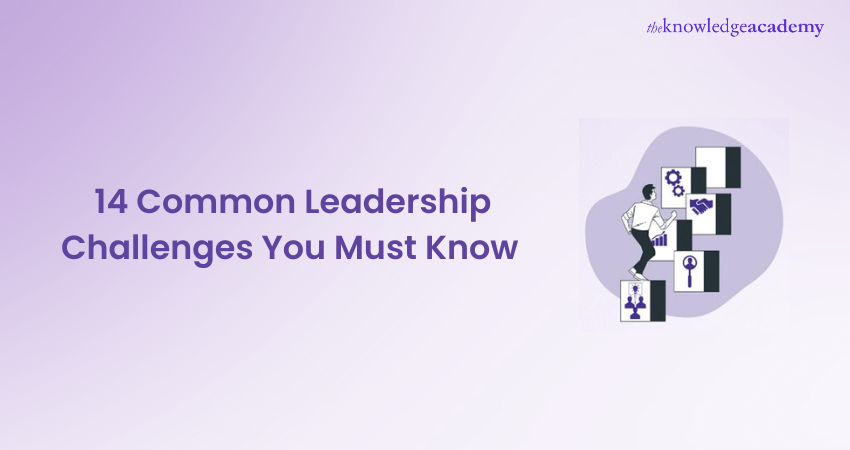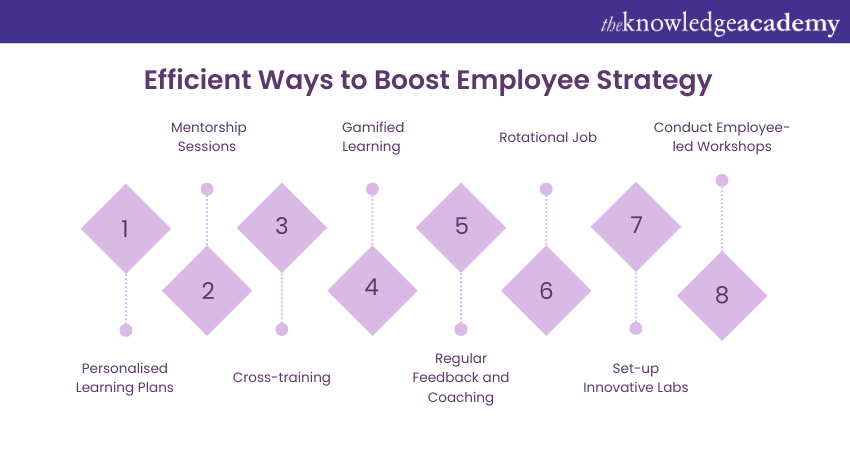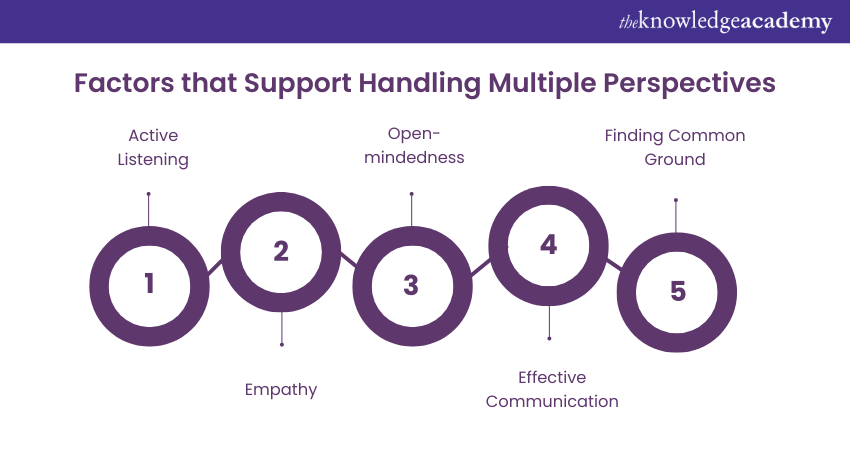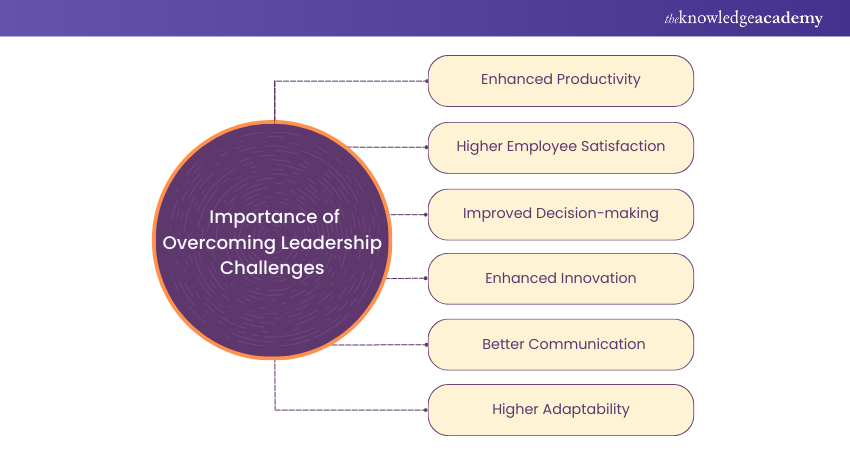We may not have the course you’re looking for. If you enquire or give us a call on +44 1344 203 999 and speak to our training experts, we may still be able to help with your training requirements.
Training Outcomes Within Your Budget!
We ensure quality, budget-alignment, and timely delivery by our expert instructors.

You might have often wondered why some leaders thrive in the face of adversity while others struggle. The key often lies in their ability to tackle the head-on Leadership Challenges. Such challenges are an inevitable part of the journey but understanding them can turn obstacles into growth opportunities. Each challenge, from maintaining team performance to making tough decisions, uniquely tests your Leadership Skills.
Willing to explore these challenges and discover strategies to overcome them? In this blog, we will delve into 14 must-know Leadership Challenges to enhance your effectiveness as a leader. So, let’s dive in and turn certain hurdles challenges into the stepping stones to success!
Table of Contents
1) Leadership Challenges- an Overview
2) The 14 Most Common Leadership Challenges
3) Leadership Challenge Examples
4) How to Overcome Leadership Challenge
5) Conclusion
Leadership Challenges- an Overview
Leadership Challenges encompass the hurdles a leader faces on the job, from hiring and firing decisions to managing personal stress. These challenges can be classified into two types: internal and external. Internal challenges involve issues within the organisation, such as resolving conflicts among team members or making detailed project decisions, requiring direct action from the leader. External challenges are forces beyond a leader’s control, often stemming from industry-wide issues like market changes, supply chain disruptions, or economic downturns.
Leaders must navigate these challenges by steering and communicating effectively with their teams and stakeholders. Understanding these challenges helps leaders develop the skills to cope and overcome them, ensuring they can lead through crises with adaptability, clear communication, and strong guidance.
The 14 most common Leadership Challenges
Facing the complexities of modern leadership qualities, here are the 8 most common challenges that leaders across the globe are navigating through in their pursuit of excellence.
1) Ethical Dilemmas
Ethical dialemmas are complex scenarios which instils a question of moral grounds to a leader. For instance, a leader might be in a situation where they have to defend the company’s best interest or save his/her job by confessing the truth regardless of the circumstances.
When one is faced with an ethical dilemma, he or she needs to seek the advice of other leaders and professionals who can bring in different views from their own individual experiences. It promotes a very careful and informed decision of the potential consequences.
2) Managing Responsibilities
Managing responsibilities effectively, especially in strategic leadership roles, involves a strategic approach to task allocation and time management. Leaders face the challenge of overseeing multiple projects and ensuring team cohesion. To mitigate the stress of strict deadlines and extensive duties, smart delegation is crucial. Breaking down projects into manageable parts allows for more focused and efficient work. The person should also adopt stress-reducing techniques such as exercises, yoga, and short relaxation in their routines which would greatly help reduce pressures on the person.
Focusing on a healthy work-life balance is helpful, not only for the leader but also to breed a positive and productive ambiance for all team members. The ability to serve their duties and maintain the balance of performance and welfare of the two, i.e., the players and the team, is greatly improved.
3) Developing Employees
Develop employees through effective coaching and mentoring on an individual basis to develop skills and capabilities. This challenge would require leaders to mold themselves to each of their employees while ensuring the supportive and collaborative environment that enhances constant learning in their professional development.

Effective development of employees by setting clear goals for them, guiding and providing resources, and regular feedback on what was achieved by them with recognition and rewards. "That these leaders invest in the growth of their employees will result in a skilled and motivated workforce that inures to the organisation's success.
4) Accepting and Distributing Feedback
Accepting and distributing feedback is crucial for leaders to foster growth and effective communication within their teams. You should develop a feedback system from team members through methods such as anonymous surveys or regular one-to-one interactions. Supervisors should seek feedback that also helps for professional development. Equally important is providing balanced feedback to team members, combining positive reinforcement and constructive criticism. Regular feedback sessions create opportunities for growth and strengthen professional relationships, promoting a culture of continuous improvement and open communication.
5) Handling Different Perspectives
The other challenge is dealing with different perspectives, as conflict may emanate from various experiences, ideas, and perspectives in the workplace. Therefore, leaders have to create an environment of inclusiveness in which the free flow of ideas is enabled. Encourage open dialogue, active listening, and compromise among team members when conflict arises.

Respecting others' views and, if another strategy is presented that is better than what you proposed, you adapt and implement together as a team. Leaders will be able to channel these opposing ideas into positive debates, development, shared understanding, and a collaborative organisational culture.
Master the art of people management – join now for our Successful People Management and Team Leadership Course
6) Advancing Technology
Advancing technology presents a challenge for leaders to stay current and competitive in their industries. To address this challenge, leaders must continuously monitor technological advancements, assess competitors' offerings, and gather feedback from employees and clients to shape future product development. It is necessary to be open to innovative ideas and willing to adapt existing tactics to introduce new methods. Upgrading workplace technology, such as utilising mobile technology solutions, can enhance flexibility and productivity. Embracing advancements and leveraging technology effectively enables leaders and organisations to remain at the forefront of their respective fields.
7) Delivering Difficult News
Delivering difficult news is a challenging task for leaders, as it requires them to communicate sensitive information while maintaining composure and empathy. When faced with such situations, leaders should approach the conversation with politeness and calmness. Being open and honest helps minimise confusion and builds trust. It is essential to show support for the team by making oneself available to address questions and concerns. Demonstrating compassion and practising good interpersonal skills allows leaders to guide their team through transitions and provide solutions when possible.
8) Delegating Tasks
This is part of the following discussion, which gives further proof showing that delegation is a very vital strategy for any leader who wants to enhance productivity in their working environment. It involves trusting team members with responsibilities, thereby promoting efficiency and team engagement. Drawing parallels from Michael Jordan's experience, where delegation and trust in his teammates led to significant achievements, leaders in any field can learn the importance of sharing responsibilities.
In a practical sense, delegation allows leaders to focus on strategic objectives while leveraging the specialised skills of their team members. For instance, entrusting a top accountant with budgeting tasks or empowering a department to lead product development demonstrates confidence in their abilities. This approach not only reduces stress for leaders but also motivates and involves employees, creating a more dynamic and cohesive team.
9) Upholding Team Performance
Maintaining high team performance is crucial for achieving organisational goals. Leaders must ensure that team members are motivated, engaged, and have the necessary resources to perform their tasks efficiently. Regular performance reviews, clear communication of expectations, and recognition of achievements are essential strategies for upholding team performance.
Cultivate a Leadership approach that prioritises ethics and accountability – join our Ethical Leadership Training now!
10) Influence
Effective leaders must be able to influence others to gain support for their ideas and initiatives. This involves building trust, demonstrating credibility, and communicating persuasively. Influence is not about authority but about inspiring and motivating others to follow your lead.
11) Leading Change
Leading change is a significant challenge as it involves guiding your team through transitions and transformations. This requires clear vision, effective communication, and the ability to manage resistance. Leaders must be adaptable and resilient, providing support and direction to their team throughout the change process.
12) Developing Your own Skills
Continuous self-improvement is vital for effective leadership. Leaders should seek opportunities for professional development, such as training sessions, mentorship, and self-reflection. By enhancing their skills and knowledge, leaders can better support their teams and drive organisational success.
13) Guiding Change
Guiding change involves not only implementing new strategies but also ensuring that the team adapts to these changes smoothly. Leaders must provide clear guidance, address concerns, and foster a culture of openness and flexibility. Successful change management requires patience, empathy, and a proactive approach.
14) Making the Hard Decisions
Leaders are often faced with difficult decisions that can impact their team and organisation. Making these decisions requires careful consideration, weighing the pros and cons, and sometimes making unpopular choices. Effective leaders are decisive, transparent, and take responsibility for their decisions, ensuring they align with the organisation’s values and goals.
Learn the efficient techniques to inspire your team – sign up for our Staff Motivation Training today!
Leadership Challenge Examples
Here are some typical challenges you might face as a leader, along with strategies to overcome them:
1) Feeling Overwhelmed: Leaders juggle their own tasks while being accountable for their team’s work, including managing budgets, allocating tasks, and handling disputes. This can feel overwhelming. Good organisational skills, resilience, and creative problem-solving, such as breaking tasks into manageable stages and delegating effectively, can help.
2) Communication Issues: Effective communication with team members, senior managers, and clients is crucial. Miscommunication can lead to mistakes and overlooked information. Improving communication skills, active listening, and being clear and concise can ensure everyone understands their roles and concerns.
3) Difficult Conversations: Addressing performance issues or personal disputes requires calmness, professionalism, and empathy. Leaders must handle these conversations with composure, as team members look to them for guidance and as role models.
4) Micromanaging and Delegating: Micromanaging can undermine team confidence and slow down work, while excessive delegation can overwhelm teams. Finding a balance between the two, intervening when necessary, and fostering trust and organisational skills are key.
5) Too Little Leadership: Insufficient management can occur when leaders assume their team is self-sufficient. Regular communication, understanding team processes, and providing guidance and motivation are essential to avoid this pitfall.
6) Lack of Feedback: Leaders often give more feedback than they receive. Setting performance targets, seeking feedback from senior managers and team members, and fostering self-awareness can help leaders improve continuously.
How to Overcome Leadership Challenges?
Leadership Challenges are not merely obstacles to be avoided; they are valuable opportunities for growth and development. Effective leaders understand that these challenges are an inherent part of their roles and embrace them as catalysts for positive change. Overcoming such challenges is of paramount importance, and here's why:

1) Use Feedback to Your Advantage
You should train your leaders in providing feedback. This will make them more at ease when offering their team members input on their work, particularly when addressing issues. Remind them that giving constructive feedback is not a negative action, but rather a means of helping their team achieve their full potential and become more efficient.
2) Higher Employee Satisfaction
Leadership Challenges can have a huge impact on employee morale and job satisfaction. Leaders actively tackling these hurdles fosters a work culture that values employee well-being and growth. Employees are more likely to feel appreciated, supported, and engaged, leading to enhanced job satisfaction and a reduced risk of burnout or turnover.
3) Improved Decision-making
Leaders who learn to overcome decision paralysis and make informed choices set a powerful example for their teams. Sound decision-making inspires confidence and trust among team members. It is because they are likely to follow and respect leaders with a proven track record of handling challenges adeptly. Moreover, better decision-making leads to more effective strategies and outcomes for the organisation.
4) Enhanced Innovation
Addressing demanding situations encourages innovative problem-solving and out-of-the-box questioning. When leaders embrace the unknown and seek for modern solutions, it builds the stage for a culture of innovation inside the entire organisation. This mindset can foster continuous improvement and a willingness to discover new possibilities.
5) Better Communication
Effective leadership entails clear and transparent communication. By proactively tackling communication breakdowns and promoting an open and inclusive communication culture, leaders build trust and understanding within their teams. This paves the way for smoother collaboration, reduced conflicts, and an overall healthier work environment.
6) Higher Adaptability
Adaptability is crucial for an organisation's survival in today's fast-paced and rapidly evolving market. Leaders who embrace challenges head-on and encourage adaptability within their teams position their organisations on top. They also stay competitive and relevant in dynamic markets.
Conclusion
Navigating the maze of Leadership Challenges can be daunting, but the right strategies can aid you turn obstacles into opportunities. Remember, every challenge you conquer not only strengthens your leadership but also empowers your team to achieve greater heights. Keep pushing forward, and let such challenges guide you toward success!
Unlock your potential and become the leader your team needs – join our Leadership Skills Training now!
Frequently Asked Questions

Common Leadership Challenges in today's dynamic business landscape include managing remote teams, adapting to rapid technological advancements, fostering innovation and creativity, navigating organisational change, promoting diversity and inclusion, and addressing ethical dilemmas.

Yes, with a shift in attitude, Leadership Challenges can become opportunities for growth. Overcoming them enhances problem-solving, adaptability, emotional intelligence, and self-awareness, all of which are crucial for inspiring and leading teams effectively.

The Knowledge Academy takes global learning to new heights, offering over 30,000 online courses across 490+ locations in 220 countries. This expansive reach ensures accessibility and convenience for learners worldwide.
Alongside our diverse Online Course Catalogue, encompassing 19 major categories, we go the extra mile by providing a plethora of free educational Online Resources like News updates, Blogs, videos, webinars, and interview questions. Tailoring learning experiences further, professionals can maximise value with customisable Course Bundles of TKA.

The Knowledge Academy’s Knowledge Pass, a prepaid voucher, adds another layer of flexibility, allowing course bookings over a 12-month period. Join us on a journey where education knows no bounds.

The Knowledge Academy offers various Leadership Courses, including Leadership Skills and Agile Leadership Trainings. These courses cater to different skill levels, providing comprehensive insights into Organisational Leadership.
Our Business Skills Blogs covers a range of topics related to leadership skills and upskilling, offering valuable resources, best practices, and industry insights. Whether you are a beginner or looking to advance your Leadership skills, The Knowledge Academy's diverse courses and informative blogs have you covered.
Upcoming Business Skills Resources Batches & Dates
Date
 Successful People Management and Team Leadership
Successful People Management and Team Leadership
Thu 1st Jan 1970







 Top Rated Course
Top Rated Course



 If you wish to make any changes to your course, please
If you wish to make any changes to your course, please


